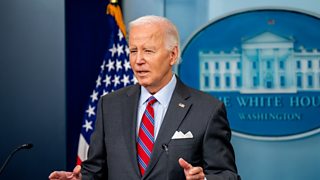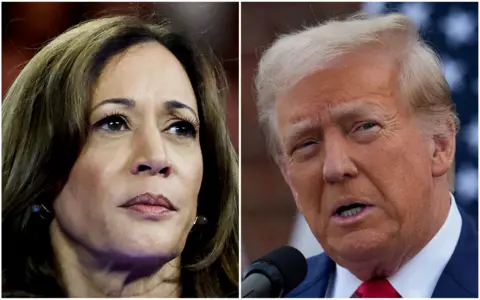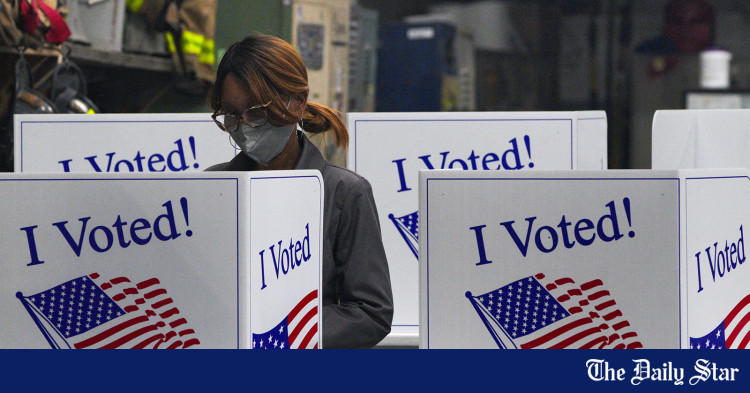Voters overwhelmingly say US democracy is under threat, exit polls show
A person votes at Engine Company 15 during the 2024 U.S. presidential election on Election Day, at a library in Pittsburgh, Pennsylvania, U.S., November 5, 2024. REUTERS
Nearly three-quarters of voters in Tuesday's presidential election say American democracy is under threat, according to preliminary national exit polls from Edison Research, reflecting the nation's deep anxiety after a contentious campaign between Democrat Kamala Harris and Republican Donald Trump.
Democracy and the economy ranked by far as the most important issues for voters, with around a third of respondents citing each, followed by abortion and immigration at 14% and 11%, the data showed. The poll showed 73% of voters believed democracy was in jeopardy, against just 25% who said it was secure.
The data underscores the depth of polarization in a nation whose divisions have only grown starker during a fiercely competitive race. Trump has employed increasingly dark and apocalyptic rhetoric while stoking unfounded fears that the election system cannot be trusted. Harris has urged Americans to come together, warning that a second Trump term would threaten the underpinnings of American democracy.
The figures represent just a slice of the tens of millions of people who have voted, both before and on Election Day, and the preliminary results are subject to change during the evening as more people are surveyed.
Harris was relying on a large turnout by women voters to compensate for her electoral weakness with men. The exit polls showed women made up 53% of the electorate, largely unchanged from the 52% in 2020 exit polls.
The share of voters without a college degree - who favor Trump - was at 57%, down slightly from 2020's 59%, according to the data.
The two rivals were hurtling toward an uncertain finish on Tuesday after a dizzying campaign as millions of American voters waited in calm, orderly lines to choose between two sharply different visions for the country.
A race churned by unprecedented events – two assassination attempts against Trump, President Joe Biden's surprise withdrawal and Harris' rapid rise – remained neck and neck after billions of dollars in spending and months of frenetic campaigning.
Trump, who has frequently spread false claims that he won the 2020 presidential election and whose supporters attacked the U.S. Capitol on Jan. 6, 2021, voted near his home in Palm Beach, Florida.
"If I lose an election, if it's a fair election, I'm gonna be the first one to acknowledge it," Trump told reporters.
Harris, who had earlier sent in her ballot by mail to her home state of California, spent some of Tuesday in radio interviews encouraging listeners to vote. Later, she was due to address students at Howard University, a historically Black college in Washington where Harris was an undergraduate.
"To go back tonight to Howard University, my beloved alma mater, and be able to hopefully recognize this day for what it is, is really full circle for me," Harris said in a radio interview.
HISTORY IN THE MAKING
The exit polls showed Harris was viewed more favorably than Trump in Michigan, Wisconsin, North Carolina and Georgia, four of the seven states that are likely to decide the election, though her ratings were still lower than Biden's in the 2020 exit polls.
Trump was viewed more favorably than Harris in two of the swing states - Nevada and Pennsylvania - and the two candidates were tied in Arizona.
National exit-poll results provide an important window into the thinking of the nation, but may not directly align with the seven battleground states expected to decide the presidential election.
Exit polls capture variations among turnout in various demographic groups, such as men vs women voters or college-educated vs non-college educated voters, and can provide insights into how turnout has changed from past elections.
One key advantage of exit polls is all the people surveyed, by definition, are people who cast ballots in this election.
Opinion polls before the election showed the candidates running neck and neck in each of the seven states likely to determine the winner: Arizona, Georgia, Michigan, Nevada, North Carolina, Pennsylvania and Wisconsin.
No matter who wins, history will be made.
Harris, 60, the first female vice president, would become the first woman, Black woman and South Asian American to win the presidency. Trump, 78, the only president to be impeached twice and the first former president to be criminally convicted, would also become the first president to win non-consecutive terms in more than a century.
Control of both chambers of Congress is also up for grabs. Republicans have an easier path in the U.S. Senate, where Democrats are defending several seats in Republican-leaning states, while the House of Representatives looks like a toss-up.
Trump's campaign has suggested he may declare victory on election night even while millions of ballots have yet to be counted, as he did four years ago. The winner may not be known for days if the margins in battleground states are as slim as expected.
In Dearborn, Michigan, Nakita Hogue, 50, was joined by her 18-year-old college student daughter, Niemah Hogue, to vote for Harris. Niemah said she takes birth control to help regulate her period, while her mother recalled needing surgery after she had a miscarriage in her 20s, and both feared Republican lawmakers would seek to restrict reproductive healthcare.
"For my daughter, who is going out into the world and making her own way, I want her to have that choice," Nakita Hogue said. "She should be able to make her own decisions."
At a library in Phoenix, Arizona, Felicia Navajo, 34, and her husband Jesse Miranda, 52, arrived with one of their three young kids to vote for Trump.
Miranda, a union plumber, immigrated to the U.S. from Mexico when he was four years old, and said he believed Trump would do a better job of fighting inflation and controlling immigration.
"I want to see good people come to this town, people that are willing to work, people who are willing to just live the American dream," Miranda said.











































